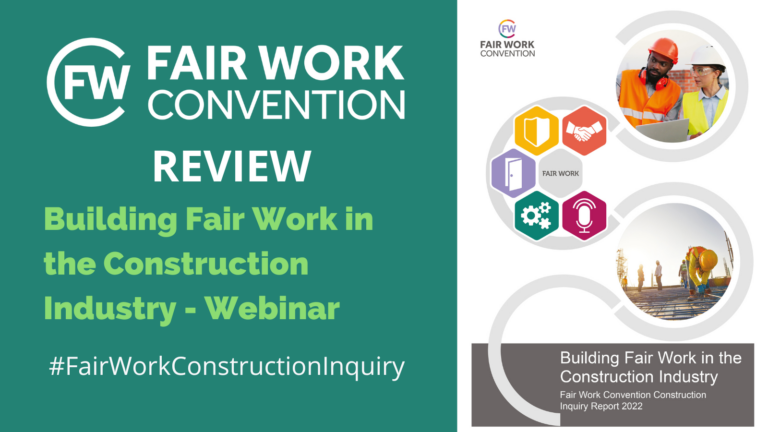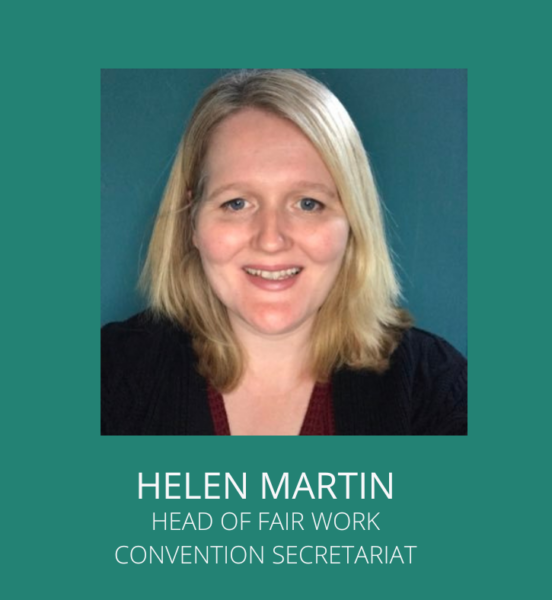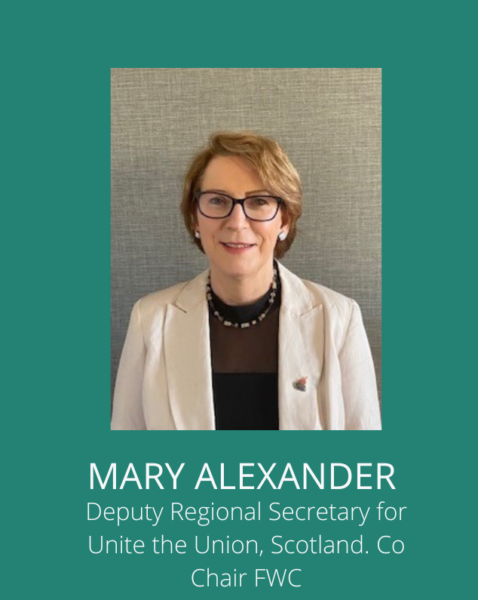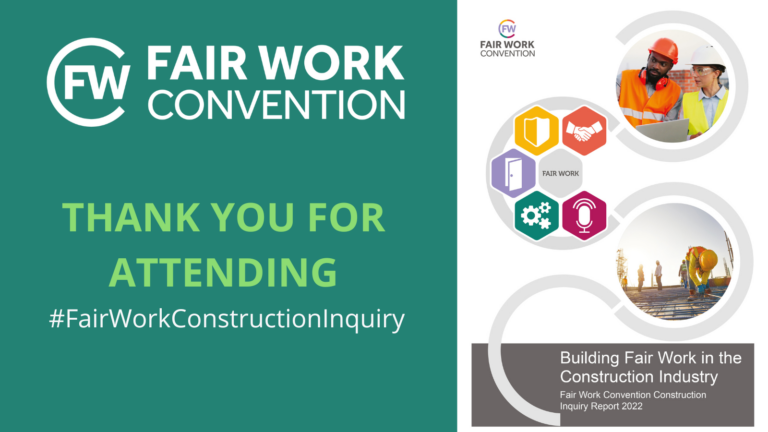
The Fair Work Convention’s ‘Building Fair Work in the Construction Industry’ webinar was an opportunity to review the Conventions recently published report and recommendations on fair work in Scotland’s Construction Industry. The report was the conclusion of a two-year inquiry which involved research and extensive engagement with stakeholders as it calls for urgent action from the Scottish Government, Employers, Unions and Industry leadership groups to build fair work into the industry.
The event was chaired by co-chair of the Fair Work Convention, Professor Patricia Findlay and the Convention invited the Minister for Business, Trade, Tourism and Enterprise Ivan McKee MSP and Alan Wilson, CICV Chair and Managing Director of electrical trade association SELECT as guest speakers to offer their thoughts on what the report and recommendations mean in practice for the construction industry.
Attendees also heard an in depth analysis of the Construction Inquiry report from Head of the Fair Work Convention’s Secretariat, Helen Martin and from the Construction Inquiry’s co—chair Mary Alexander who, provided her perspective from a workers point of view as Deputy Regional Secretary for Unite the Union, Scotland.
 Helen Martin said that the construction industry faces many challenges but encouragingly the building blocks for collaborative working and supporting skills, standards and fair work in the industry all still exist. It is therefore crucial that the actions of Scottish Government and other public bodies and agencies – either in procurement, in skills or in investment – support fair work outcomes.
Helen Martin said that the construction industry faces many challenges but encouragingly the building blocks for collaborative working and supporting skills, standards and fair work in the industry all still exist. It is therefore crucial that the actions of Scottish Government and other public bodies and agencies – either in procurement, in skills or in investment – support fair work outcomes.
To make fair work a reality for all in the industry, government and other public agencies must support the existing collective agreements and promote their use and effective implementation. Recognising, valuing and using these agreements and collaborative and inclusive ways of working in the industry will help us support fair work and modernisation within construction and also achieve Scotland’s Net Zero carbon targets.
A summary of the report and recommendations can be found in our Executive Summary
The Fair Work Convention have made a commitment return to this Inquiry after five years to examine how well recommendations have been adopted and evaluate the industry against the fair work outcomes within this report.

“This is a golden opportunity to utilise the public spend in construction in a way that drives fair work in the industry and improves worker standards” Mary Alexander Deputy Regional Secretary of Unite
Mary Alexander is Deputy Regional Secretary of Unite and was co-chair of the Construction inquiry. She spoke about the need for improved fair work in the construction industry and how implementing the recommendations of the report would make difference to workers on the ground.
Mary said that the core issue under investigation in the construction inquiry was the experience of fair work by the construction workforce and how fair work practice can be improved, with an emphasis on the role of public sector procurement.
Addressing fair work in construction now is crucial to how the industry develops to face future challenges. Wider adoption of fair work can underpin a high quality, high value, responsive construction industry. Mary said that our collective priority should be to ensure that the construction workforce benefits from this report and that fair work becomes a more common experience for employees and workers addressing issues such as job insecurity, unfair wages, health and safety conditions and access to training and continued professional development.

“Cooperation, collaboration and commitment are crucial in all parts of the sector from the supply chain, employers and trade unions and as importantly the clients themselves to make change happen” Alan Wilson Chair of CICV and Managing Director of SELECT
Alan Wilson is chair of the Construction Industry Collective Voice which is a collaboration of leading trade and professional bodies in construction. Alan is also the Managing Director of SELECT, Scotland’s electrical trade association. Alan provided a perspective from an employer organisation and from beyond the inquiry group on the inquiry’s findings and recommendations.
Alan said that the most important part of the Fair Work Inquiry report was bringing people together so that everyone in the construction industry is pulling in the right direction. Procurement and prompt payment for many employers, particularly those who work in the public sector is an issue that continually frustrates. One of the things that Alan highlighted was that he would like see improvements around the procurement process ensuring fair pay and fairer work for both employees and employers.
Alan talked of the importance of taking forward the recommendations from the fair work report to ensure that good employers are recognised and rewarded and that properly qualified trained operatives fulfil quality work and paid fairly. He also added that it is very important to be seen to be offering good, well paid jobs that offer training and opportunities to attract more young people into construction.
He noted that the Net Carbon Zero recommendations within this report are also an important part of what the industry is trying to achieve, as we face the effects of the cost of living crisis. It is therefore vital that the Scottish Government, trade unions, employers and clients to work closely together to embrace the net carbon zero opportunities in technologies and upskilling of the workforce.

“The construction sector underpins the Scottish economy, and the industry must take effective action to support fair work and modernisation” Ivan McKee MSP, Minister for Business, Trade, Tourism and Enterprise
The final speaker of this event was Ivan McKee MSP, Minister for Business, Trade, Tourism and Enterprise, who gave the Scottish Government’s reflection on the Construction Inquiry report and recommendations.
Ivan McKee thanked the Fair Work Convention and the Construction Inquiry group on behalf of the Scottish Government for the extensive research that was undertaken in developing this report and recognises how transformative it will be in bringing about change for the construction industry and its workers.
He noted that fair work is at the heart of the Scottish Governments ambitions to achieve a wellbeing economy and Scotland’s Just Transition to Net Zero as set out in the recent National Strategy for Economic Transformation. Scottish Government’s vision for Scotland is to be a leading fair work nation by 2025 and so the Government are very focused on taking forward the Fair Work First agenda at pace.
As the construction industry underpins much of Scotland’s economy, Mr McKee welcomed the Fair Work Convention’s inquiry and values the direction and recommendations highlighted in its report. The Scottish Government are committed to using the leavers at their disposal through public sector spend and above the norm of minimum statutory employment rights to embed a fair work culture within construction and other industries.
Mr McKee also recognises that the construction industry suffers from a lack of new workers coming into the industry and so the fair work agenda has much to contribute to attracting new talent with work which increases security and opportunities for workers.
Mr McKee Chairs the Construction Leadership Forum and its focus is on transformation of the sector which the fair work agenda plays a key part. The recommendations from the report will give a clear focus on practical actions needed to embed fair work into the Construction Industry in Scotland.
The Scottish Government will make an official response to the Building Fair Work in the Construction Industry report and recommendations shortly.
Panel Q&A Session
The panel then had an open discussion and took questions from our audience on a wide range of issues such as: Conflict Avoidance Processes, collective bargaining, low wages and poor terms and conditions, procurement and mandating standard terms and conditions, supporting diversity in the workforce, how to reducing the disability employment gap, supporting apprenticeships, measuring achievement, the impact of recession, net zero ambitions, retrofitting and re-skilling.
To summarise what was an excellent session and debate, the event highlighted the need to work together across the construction industry for all relevant stakeholders to adopt our recommendations.
On behalf of the Fair Work Convention we would like to thank everyone who contributed to and attended our event.

